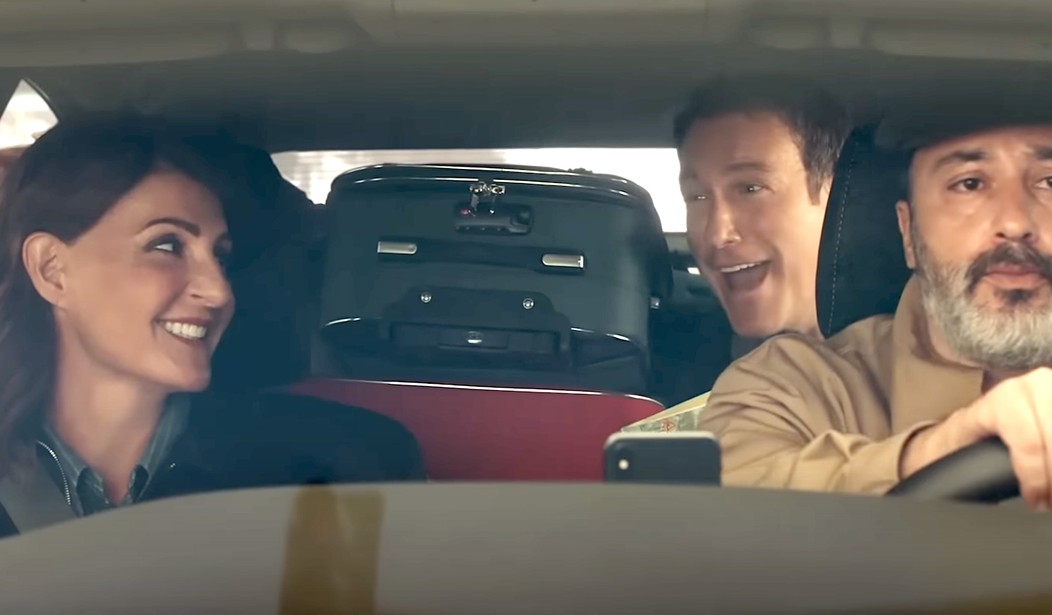If you’re a fan of the “My Big Fat Greek Wedding” film series, you’ll need to see the latest installment to round out your collection. While not as excellent as the first two films, it is still full of heart and joy. The plot is solid if utilitarian fare, delivering an enjoyable tale that can be told in 91 minutes. But MBFGW3 also lays on the schtick with a trowel, which is unfortunate, and there are gratuitous plot points designed to promote today’s favorite progressive values: gender shenanigans and unchecked, culture-erasing, nation-impoverishing migration.
In MBFGW3, writer/director/star Nia Vardalos once again delivers a humorous and sentimental tribute to the value of family as well as the classic American immigration experience of hard work and middle-class success and prosperity. The film’s plot brings the familiar cast to the Greek Isles, as Vardalos’s character, Toula Portokalos, has been tasked with bringing her recently deceased father’s journal to his childhood friends in the Greek island village where he grew up. Coincidentally, the mayor of the village, a young woman named Victory, has invited the town’s diaspora back for a reunion. Vardalos does a great job capturing the culture, food, and behavior of island Greeks, and the film shows off the location and its atmosphere beautifully.
But there were a few things that rubbed me the wrong way, and I’m not just talking about the over-the-top gross peccadillos of Toula’s brother, Nick, and the overuse of stale running jokes. First of all, for no particular reason, the village mayor, Victory, sometimes feels like a woman and sometimes a man. Aunt Voula made a point of telling her she had a gay son and asking about it, so Victory could speak about her gender fluidity. And in a wedding scene, where traditional dances place men in one line and women in another, Victory moves from side to side.
Another bee in my bonnet was the film’s uncritical acceptance of the deluge of migrants across the country. SPOILER ALERT: One of the plot lines involves a love affair between a young Greek man and a Syrian refugee woman. The female love interest was brought to the island as an orphaned child and raised in the Greek culture — “assimilation,” we used to call that, back in the bad old days. And if this girl were a rarity — if the number of refugees were limited and assimilated — it would be nothing but good for the host country. But that is not what is happening all across the West, and the film does nothing to address the vast, bottomless scope of the crisis.
Related: Movie Review: ‘Sound of Freedom’ Shines a Light on the Issue of Human Trafficking
But the most unsettling problem in the film was that, while Greek superstitions were played way up (and when I spent time with Greek country relatives in my youth, I certainly never saw such a level of nonsense), the Greek Orthodox faith was almost nowhere to be found.
Yes, there is a mysterious monk who lives on the beach, although his small role is more that of a record keeper than a spiritual leader. But the film’s climax is the wedding between the Greek and Syrian lovers. And don’t get me wrong — it’s beautiful. The movie depicts a joyous celebration that intertwines Syrian and Greek traditions. But at the point where the couple actually marries, the ceremony is not shown. They are escorted by the entire village to a mystical, vague building that we can’t quite make out, surrounded by candles, and we can assume it’s a small chapel on the beach if we like.
But Vardalos stopped short of showing an Orthodox Christian marriage ceremony, which she has done in both of the previous films. This third Greek Orthodox wedding would have been a beautiful harkening back to Toula and Ian’s wedding in the first film.
I suspect the omission was made so as not to offend Muslim filmgoers, who don’t want to see an ethnically Muslim woman embracing Christianity. But it’s a radical departure from Vardalos’s loving, respectful, and comical but very prominent inclusion of her faith in MBFGW1 and 2. The GO church is the beating heart and very soul of Greece. There is no Greek culture without Greek Orthodoxy.
I am always confounded by liberals like Vardalos who clearly love their culture but somehow can’t see that their promotion of transgender ideology as well as unlimited (Muslim) immigration will eventually erase that culture and, eventually, that church. (But that is, of course, the ultimate goal of Progressivism: to finish off Jesus once and for all.)
It’s bizarre to see Vardalos’s manifest Hellenic pride and patriotism shine through in her films (there’s even a hearty nod to Nikos Kazantzakis’s classic novel “Zorba the Greek” in the role of Mayor Victory) yet at the same time see her openly promoting the destruction of her proud ancient culture. Perhaps she is secure in the knowledge that the private Greek island on which she parties with her pals, Tom Hanks and Rita Wilson, and their pals, the Obamas, will remain a safe, luxurious, and exclusively Greek-themed haven. She and her wealthy friends can enjoy sipping retsina and ouzo while the mainland slowly becomes unrecognizable, homogenized into undifferentiated, Godless, globalist goo.
Then perhaps they can all jet-set to one of the Obama’s island manses — on Martha’s Vineyard or Hawaii — and watch the same thing happen to the United States.










Join the conversation as a VIP Member